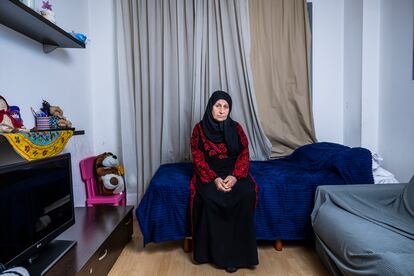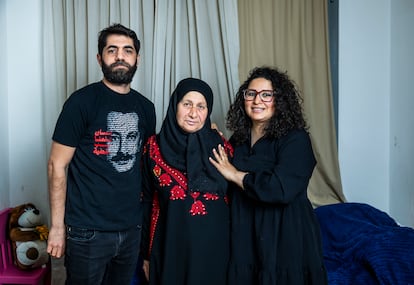Fleeing Gaza after living through endless wars: ‘I can’t forget the destruction I have seen’
Jamila Rasheed, 68, left the Strip for Spain to live with one of her children on a short-term visa. Her home in Nuseirat was destroyed in a bombing days after her departure

Jamila Rasheed has lived through countless wars in Gaza since she was born in the Strip in 1957, after her parents were displaced in the 1948 Nakba (the “catastrophe” for Palestinians, following the declaration of the State of Israel and expulsion from their lands). She had never thought of leaving her home in the Nuseirat camp in the center of Gaza, remaining there through subsequent conflicts no matter what fell from the sky. Until now. Against her will, she clarifies, one of her sons — a French national, but a Lebanese resident — asked the French Foreign Ministry to arrange for his parents’ departure last December.
“I didn’t want to leave, my daughters, my son, my country and my heart are still there,” says Jamila. After four months of waiting, on April 10, she left through the Rafah crossing in southern Gaza and traveled from Cairo to Paris, and then from there to Madrid, where another of her sons, Arafat Alhaj, 40, lives. In the next few days, Alhaj expects his father to arrive via the same route. “We thought it was safer for them to come to Europe. We knew they would not survive there,” he says. A report by the Euro-Med Human Rights Monitor warned in March of the “high” number of elderly victims in the Israeli offensive in the Strip: around 7% of the victims of the war are senior citizens.
“Can you imagine her fighting for food?” Alhaj says of the risks posed by attempting to access the scarce aid that is distributed, especially for someone of his mother’s age. “In seven months I ate no eggs, no meat, no milk. I bought tomatoes once, and lentils at $9 a kilo,” says Jamila. “Throwing aid in the air is dangerous, but above all, it’s humiliating. They are not animals. But that’s what they want us to see, wild people fighting for food, without dignity,” says Laila Samara, her daughter-in-law, a sociologist by training and a former United Nations World Food Program worker in Turkey.
Jamila gasps every time the thunderous sound of planes taking off or approaching the runways of Madrid-Barajas airport, less than 1,000 meters from the small apartment her son and daughter-in-law rent, comes through the window. The woman looks skyward to check that there is no danger. “I’m very stressed. It’s like torture. I can’t forget the destruction I have seen. Every moment we were waiting for the call to alert us to get out of the house and run. When you see people die, you cry; but I’ve cried more since I’ve been here, remembering it.”
One of the images that has stuck in her memory is the bombing of the home of one of her daughters. “We pulled my unconscious grandson out of the rubble. We don’t know how he survived, it was a miracle,” she says with visible emotion. “My daughter was sent to Rafah for shelter, then back again, and now she’s back in Rafah.” But Israel’s announced ground incursion into the city, the last refuge for more than a million Palestinians displaced from other areas of Gaza, could change the situation drastically at any moment.
“I felt very bad packing my suitcase. The night before, because I knew I was leaving, I couldn’t sleep,” Jamila recalls, who has a three-month tourist visa for Spain. French authorities gave her the option of obtaining a longer permit as an asylum seeker, but she declined because she plans to return.
— “I want to go back, even if they won’t let me,” she says.
— “But you no longer have a home,” replies her son.
— “Then I’ll live in the street,” she replies.
A few days after her arrival in Spain, Jamila learned that the building in which she lived had been destroyed in a bombing. In a video that reached the family of the aftermath of the attack, she was able to make out some of her belongings among the rubble. “We were all civilians there. I don’t have anything anymore. I wish I had been there and died,” she sobs.
Nuseirat has been under heavy attack in recent days and Jamila is worried because her son who still lives there is sleeping rough; all the shelters and his relatives’ homes are overcrowded. And her four daughters and more than 20 grandchildren, although they have been taken in by their in-laws, are also in danger. Jamila knows firsthand that, as the UN says, “there is no safe place in Gaza.”

“While she was there, she had no electricity and no [internet] connection to keep up with what was happening. For two months, we couldn’t talk to her, we couldn’t hear her voice,” explains the daughter-in-law. “Even between us, inside, we couldn’t communicate,” Jamila adds. Now she is glued to the phone 24 hours a day, on social networks and messaging groups where Palestinians share information, while also following the news in the international media. “We are worried about our nephews’ illnesses. There is no drinking water,” says Samara.
The United Nations warned back in October of the risk of death faced by Gazans, especially children, due to the lack of water or ailments related to unsanitary water resources. The Hamas-controlled Gaza Ministry of Health said on April 26 that it has lost all capacity to test and chlorinate the Strip’s drinking water. As such, the enclave’s entire population “is putting their lives at risk” just by drinking.
Lacking almost everything during the day, Jamila was busy surviving. With no gas, electricity, oven, or refrigerator, she spent most of the day looking for firewood and food. Occasionally, she would queue up at stores that had working generators to charge her phone. “The engineers, the doctors... Everyone is in the same situation, without distinction. All the families are broken.” Three of her husband’s cousins died along with all their relatives in the first days of war. “We are civilians. It’s not that I think no one deserves to be killed, but I’m talking about the people I know who are not [supporters of] Hamas or other groups,” she insists. “Now we are not only fighting against Israel, but against the U.S., Germany, and the U.K., who give them weapons to kill us,” she says with tears in her eyes. “It is our right to exist and resist. It is our country.”
Having left through the intermediary of France, Jamila’s family has not had to pay the $5,000 to $10,000 that Gazans are charged as “coordination costs” for the Egyptian authorities to allow them to cross the border. They know this because, when the diplomatic route with Paris was delayed, Jamila’s sons considered borrowing money to pay “the bribe,” explains Samara. Between 80,000 and 100,000 Palestinians have left Gaza since October 7, according to the Egyptian authorities.
Cairo has reiterated that it does not want Gazans to settle in Egypt, so refugees are issued with temporary two- or three-day visas to leave the country as soon as possible. Samara explains to her mother-in-law that to return to the Strip as she wishes would cost $3,000. “I have no money; why would I pay, and to whom, to return to my home?” she asks.
France has facilitated the departure of 260 Franco-Palestinians and family members between November 1 and April 6. From October 7, the day Hamas attacked Israeli territory, until the end of April, Spain has facilitated the departure from Gaza of 187 Spanish-Palestinians, according to data from the Ministry of Foreign Affairs. In the first quarter of this year, 88 Palestinians have applied for asylum in Spain, according to Interior Ministry data. In the whole of 2023, there were 184.
For Jamila, returning to Gaza as she wishes does not seem a real possibility today. But the family has not decided what she and her husband will do when their visas expire, or rather where they will seek asylum. Jamila’s children outside Gaza are scattered between Madrid, Lebanon, and Turkey. “Maybe they will stay here, maybe they will move to a country closer to Gaza. Maybe the situation will have changed,” they muse.
Sign up for our weekly newsletter to get more English-language news coverage from EL PAÍS USA Edition
Tu suscripción se está usando en otro dispositivo
¿Quieres añadir otro usuario a tu suscripción?
Si continúas leyendo en este dispositivo, no se podrá leer en el otro.
FlechaTu suscripción se está usando en otro dispositivo y solo puedes acceder a EL PAÍS desde un dispositivo a la vez.
Si quieres compartir tu cuenta, cambia tu suscripción a la modalidad Premium, así podrás añadir otro usuario. Cada uno accederá con su propia cuenta de email, lo que os permitirá personalizar vuestra experiencia en EL PAÍS.
¿Tienes una suscripción de empresa? Accede aquí para contratar más cuentas.
En el caso de no saber quién está usando tu cuenta, te recomendamos cambiar tu contraseña aquí.
Si decides continuar compartiendo tu cuenta, este mensaje se mostrará en tu dispositivo y en el de la otra persona que está usando tu cuenta de forma indefinida, afectando a tu experiencia de lectura. Puedes consultar aquí los términos y condiciones de la suscripción digital.









































